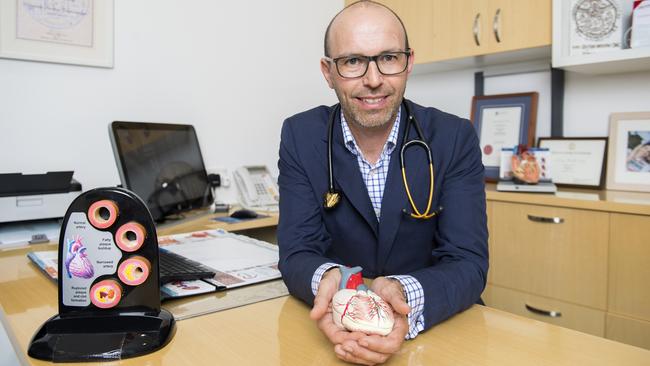Tackle biggest killer, cardiologists tell Labor
Cardiologists have questioned Labor’s “unusual” plan to target just one disease.

Cardiologists have questioned Labor’s “unusual” plan to target just one disease in its biggest election healthcare investment, amid growing calls for Bill Shorten to release more details of his cornerstone $2.3 billion cancer package.
Mental health advocates and public health campaigners have also privately queried Labor’s priorities, as some cancer specialists cast doubt on its ability to lift bulk-billing rates.
Christian Hamilton-Craig, speaking on behalf of the Cardiac Society of Australia and New Zealand, said the professional body for cardiologists “really welcomed” Labor’s major spend on healthcare, but urged the major parties to consider the leading causes of death when forming policies.
“It is unusual to target only one disease group and I think it’s important to contextualise that with the top 10 leading causes of death from the Australian Bureau of Statistics. Cardiovascular disease is causes one and three, it accounts for 17.9 per cent of deaths in Australia, and dementia is up there as well at 8.5 per cent,” said Dr Hamilton-Craig, a professor of medicine at Griffith University.
“On behalf of the Australian community, it’s important that governments invest in care which prevents particularly heart attacks and strokes because that’s what kills the most people.”
The Private Cancer Physicians of Australia group yesterday backed down on concerns about Labor’s cancer plan, as revealed in The Australian, saying they had been allayed after a briefing with Mr Shorten’s office.
Australian Medical Association president Tony Bartone said the cancer investment was a welcome sign Labor would spend more on health. “It’s an acknowledgment from Labor that Medicare rebates are woefully inadequate and we welcome that acknowledgment,” he said.
Labor has promised to invest $433 million to introduce a Medicare item, with the rebate worth about $150, to cover the cost of a person with cancer seeing a specialist oncologist and surgeon.
A further $600m would eliminate all out-of-pocket costs for cancer diagnostic imaging.
A Labor spokeswoman said the final design and implementation of the policy, including who would be eligible to receive the rebate, would be worked on through the Medicare Benefits Schedule Review. On Monday, leading oncologists could not guarantee they would bulk-bill their services, throwing doubt on Parliamentary Budget Office predictions that bulk-billing rates would double to about 80 per cent under the policy.
The Australian understands the PCPA now considers the $150 rebate adequate if it covers the cost of follow-up consultations.
“Given the information we have (from Mr Shorten’s office) the fears have been allayed,” PCPA president Christopher Steer said. “We look forward to working with the ALP to take it forward in the interest of our patients.”
Prostate cancer surgeon Henry Woo, professor of surgery at the University of Sydney School of Medicine, said the Opposition Leader’s proposal was “absolutely appealing,” but there was not enough information to determine how out-of-pocket costs for private cancer patients would be abolished or reduced.
Professor Woo said if the major financial investment did not adequately fund the true cost of providing services or conscripted health professionals to work for an unrealistic remuneration, it would “fail”. “A consultation rebate of $150 is not going to cover the true costs of running a private practice, which involves the rental of premises, the costs of staff and the provision of auxiliary materials,” he said.
Mr Shorten yesterday announced $500m under the cancer plan to help slash waiting times for public cancer patients, saying one in 10 people had to wait on average 47 days between diagnosis and surgery. “These waiting times will stun and surprise people,” he said. “This is happening to our fellow Australians now.”
Health Minister Greg Hunt said Mr Shorten’s “hollow guarantee” to private cancer patients that they would be bulk-billed had collapsed. “Labor can’t say how many (MRI) machines they’re covering, they can’t say what the rates (of the rebate) would be, they can’t actually now give a bulk-billing guarantee,” he said.



To join the conversation, please log in. Don't have an account? Register
Join the conversation, you are commenting as Logout